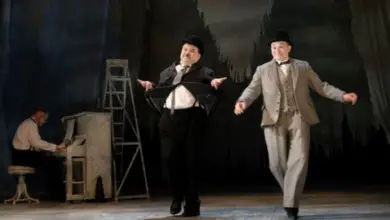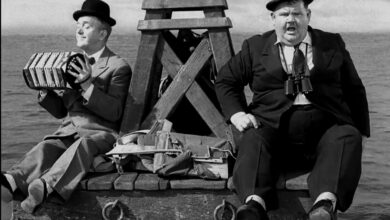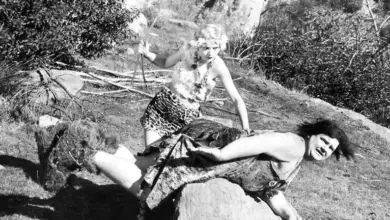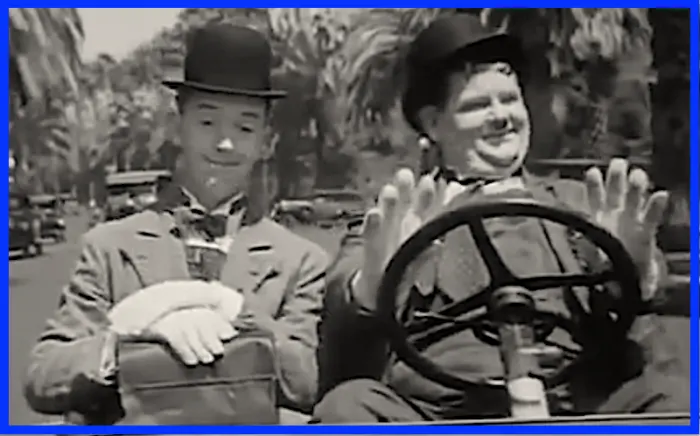Labour of Love. Laurel and Hardy in Pack up your Troubles (1932)
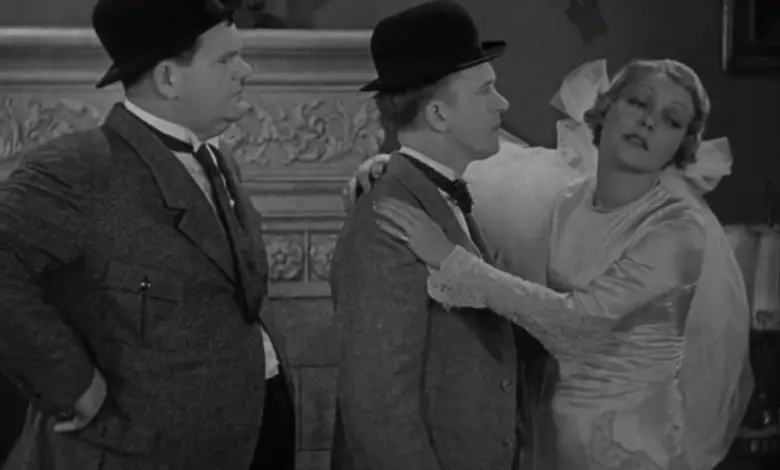
This film might have the same title as a well known World War One song, but it isn’t really a war movie. Less than half the film involves Stan and Ollie in uniform, and the rest of it tells a somewhat sentimental story involving attempts to reunite a little girl with her estranged family.
This is really the first full-length (just over an hour) L&H feature given that Pardon Us (1931) is best described as a two/three/four reeler that steadily got out of hand. Pack up your Troubles was intended from the first as a feature length film in the sense of it being a filmed narrative intended from the first to tell a feature length story.
Nobody would introduce a friend to Stan and Ollie by showing them Pack up your Troubles. Pack up your Troubles is an absolute must for completists, for people whose love for Stan Laurel and Oliver Hardy is such that they are determined to leave no Laurel and Hardy film unwatched. It’s laboured. It’s a labour of love.
As the film opems, the boys are relaxing in a park when they learn that America has entered the Great War. After an attempt to evade military service by pretending to be one-armed, they are duly enlisted. Naturally, they foul up parade drill. It is remarkably how elegantly Stan and Ollie disrupt a parade drill – something they had numerous opportunities to do during their career. When they turn the wrong way and wrong shoulder the wrong arm, they do so with a kind of balletic grace – turning a military discipline into a sort of dance. You never tire of watching this kind of aesthetic subversion.
They also make friends with a guy called Eddie. Eddie is swell. We know that Eddie swell because Stan and Ollie keep saying he’s swell. The film does not have time to illustrate any practical illustrations of his swellness, but the swellness of Eddie is central plot motivator and so it needs to be restated. They also make an enemy of a surly cook who sarcastically suggests that Stan and Ollie deliver kitchen waste to the general (James Finlayson). Stan and Ollie are not good with sarcasm and carry out the order, naively squealing on the cook later, setting up the final knife-wielding chase shot of the film.
Meanwhile swell Eddie learns that his wife is leaving him and shows no interest in their infant daughter, who cannot even be placed with her grandparents – who’ve been estranged from Eddie following his marriage. At the front, Stan and Ollie learn of this and are determined to see what they can do for the girl.
The scenes at the Western Front are bafflingly brief in the context of the film as a whole. Perhaps they were too expensive. There is something rather elegant about the way Stan and Ollie perform their careful (yet careless) morning ablutions while the hell of trench warfare rages all about them. And then there’s a bizarre scene where Stan and Ollie, seeking shelter in an abandoned tank in No Man’s Land, somehow manage to accidentally steer this tank into a German trench – forcing the Germans out of the trench – and then neatly wrapping them up in barbed wire for surrender purposes. You would have thought that such bizarre heroism would have resulted in medals galore and our heroes being set up for life – but apparently not.
Swell Eddie does not make it home.
The rest of the film, which is most of the film, consists of Stan and Ollie trying to protect Swell Eddie’s daughter. They rescue her from a truly hideous Richard Cramer (the vicious judge from Scram), an abusive foster father who only cares about the welfare cheques he earns from her. Then they set about trying to find her grandparental family – and unfortunately they have nothing to go on but the surname “Smith”. After many many wrong Smiths, culminating with the boys wrecking a society wedding and being shot at by the father of the bride (the irrepressible Billy Gilbert), the boys suddenly find that social services are intent of putting the girl in an orphanage. There’s a scene in a bank, a running off with a “loan”, a bunch more chase scenes, a dumb waiter, a reconciliation with grandparents, and the sudden return of the knife-wielding cook.
There are some nice moments of clowning in the apartment the three of them share. The little girl manages to put Stanley to sleep while telling him the story of Goldilocks. Ollie manages to hurt himself quite a bit while doing the ironing. But they are shackled to a sentimental storyline that interrupts them whenever they look like being too funny for too long. Ho hum.
There are many many instances of failed attempts by those adept at comedy shorts to produce feature films. This is one of them. At least while watching this film, you know that Sons of the Desert and Way out West are still to come – movies that you wouldn’t want to shave a hemi-demi-semi quaver off.
I would have to say that Pack up your Troubles is my least favourite L&H feature of the 1930s. At times it reminds me of the L&H features of the 1940s, in its unfortunate insistence on subordinating the clowning to a plot that we’re not really interested in. At the same time, it’s nowhere near as bad as the worst L&H features of the 1940s, the ones where Stan Laurel has been stripped of any creative input. Perhaps another way of describing films like Air Raid Wardens and Nothing but Trouble, is that they’re like the very worst bits of Pack up your Troubles – all the way through.

